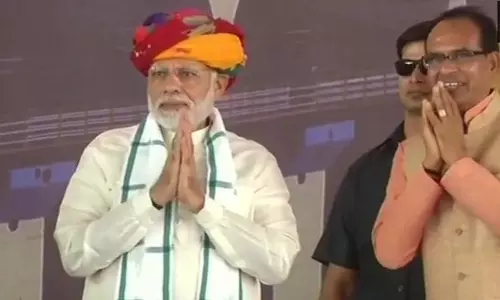
When religion and social justice come into conflict
text_fieldsDebate is still on, in and outside the court, about the petition filed in the Supreme Court demanding lifting the bar on entry of women into Sabarimala, the largest pilgrim centre in south India.
The debates were triggered by the five-judge bench headed by Chief Justice that has been hearing the arguments on the petition filed by Young Lawyers' Association asking for removing the ban on entry of women between the ages 10 and 50 into the temple. Three judges including the chief justice expressed the view that women of all ages could be allowed to enter there. The Chief Justice, who pointed out that if men are allowed to enter there, women should be allowed too, also stated that there is nothing called a private temple, and all temples are public. At the same time, Senior Counsel K Parasan, who appeared for NSS, argued that the subject before the court is not a social issue, but a religious one. If the reforms intended are under Article 25(2) of the Constitution, it will deprive Sabarimala of its identity. If the court decides to annul the restriction in Sabarimala, it will affect the very characteristic of the temple, and will constitute a violation of the right of the believers under Article 25(1). Affidavits have also been filed by the LDF-led government of Kerala in favour of women's entry, and by Travancore Devasvom Board opposing the entry. It is yet to be seen what the verdict will be after detailed arguments. However, as Advocate K Parasan pointed out, there will remain the serious conundrum of what to do when Article 25(1) that guarantees religious freedom comes into conflict with issues of social justice.
Controversy has also surfaced on a kindred issue following the light of the recommendation by National Women's Commission that confessions should be stopped. What persuaded the Women's Commission to recommend banning the very practice of confessions, was the complaint about four Christian priests having sexually abused the faithful under the cover of confession and the events that followed. Confession is a compulsory religious practice of Catholic churches. The moves to ban it in toto, merely based on the complaint that some priests have misused it, is not only unacceptable to the Christian community or the church, but is also staunchly opposed by them. On this same basis, the National Commission for Minorities has rejected the Women's Commission's suggestion. It has to be borne in mind that members of both these national commissions were appointed by the BJP-led union government.
Perhaps by sheer coincidence, the third issue is also related to gender justice. A sub-section of Shia community, the Dawoodi Bohras, are a community that sees circumcision of women as a religious act. A petition that the Supreme Court admitted demands banning this. Advocate Rakesh Khanna, who appeared for the petitioners, argued that when girls aged five and seven are subjected to circumcision, they are made to suffer serious torture. The court intervened at that very moment and asked whether it would not be in contravention of constitutional provisions. The Central Government also has submitted to the court that circumcision is to be ended.
All the three incidents mentioned here are of similar nature. There is no doubt that our Constitution is rooted in secular democracy. And hence religion has serious limitations in interfering with social life. Questioning the laws introduced by the state aiming at social justice on the basis of religious beliefs, are bound to invite strong opposition. At the same time, the Constitution is not anti-religion, and further it also guarantees complete freedom of faith. The Supreme Court had made it clear while delivering the judgement in the Triple Talaq case that freedom of religion also meant freedom to practice one's religious beliefs and customs. It is on the basis of that that Muslim Personal Law (Shariat) still prevails in the country. But the crux of the issue is what to do if a section of the society or the government deems any religious custom as violating social justice. A large section claims that it is discriminatory to deny entry only for women to Sabarimala when a Constitution that upholds gender equality is in existence. However, the shastris, and tantrics, and the Devaswom Board which sides with them, point out that allowing women to enter is against the concept of celibacy that surrounds Lord Ayyappa and that menstruation disqualifies them from their entry to Sabarimala.
Similarly, the Women's Commission claims that since confessions have been misused widely by the priests as an opportunity for sexual harassment, it should be stopped as it is an issue of dignity and pride of a woman. Another section claims that banning a mandatory religious custom in the name of likelihood of misuse by a few, cannot be approved of. Although majority of the Muslims believe that female genital mutilations are not a religious practice but a tribal ritual, the matter has reached the court as a religious liability of Bohras belonging to Shia minority. The narrow distinction between religious and temporal matters is a major riddle that calls for a subtle resolution. It is yet to be seen whether the Constitutional bench of the apex court will deliver a verdict that delineates this.
















.jpg)
